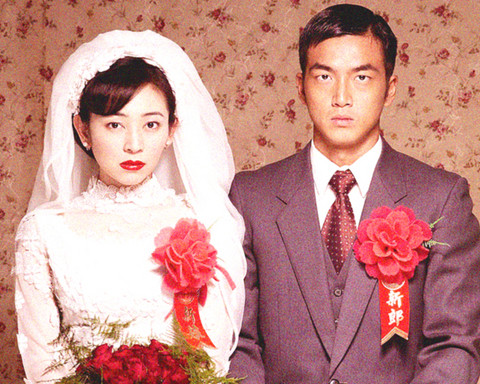This week, Tanshui is once more being celebrated in the reincarnation of Godot Theatre Company's perennial favorite Little Town of Tanshui.
Adapted from Thornton Wilder's Our Town, this is the play's fifth incarnation in Taiwan, which was first introduced on the stage for the Taiwan audience in 1989 and was last seen in 1999.
Why did writer and director James Liang (梁志民) feel the need to reinvent the story again?

PHOTO COURTESY OF GODOT
"It's been 17 years since audiences in Taiwan first experienced the story on stage," explains Godot's head of
marketing Alice Yang (楊玉玲).
"In each version, the presentation was always different to reflect the different actors and different tones. The play has always been very well received in all its different forms over the years so that audiences actually look forward to its next incarnation. For our performance this year, we wanted to capture the essence of Tanshui in a poetic, almost dream-like way, and to do so we used high-powered projectors to present subtle but very atmospheric paintings in the background as the story unfolds."
Set in the 40s and 50s in the then quiet port town of Tanshui, the story is told through a storyteller played by Tao Da-wei (陶大偉), who in his theaterical debut has the ability to pause, fast-forward, and rewind the events seen on stage. With him, we observe the characters in this town, mainly two families, the Chens and the Ais, and their children, particularly Shao-wei and Jasmine. The story follows their lives through 20 years of childhood, courtship, marriage and ends with Jasmine recollecting their lives together on Shao-wei's tomb.
In adapting the story for Taiwan, one might wonder, why Tanshui?
"Tanshui at that time was at its start of development," explains Yang.
"There were people arriving from the mainland, the local residents and the Mackay Memorial Hospital (馬偕醫院) doctors. It wasn't a rich or politically important town, and yet they all worked together harmoniously and over decades dedicated their lives to the land and slowly breathed life into the Tanshui we know today. In the process they showed the best side of humanity."
One of the key attractions of this year's variation is Tao who, himself a famous singer and father of pop icon David Tao, expressed his strong desire to appear for the first time on stage and to infuse the story with his unique trademark humor.
"This is ultimately, a simple story of life," says Yang. "There's a symbolic moment in the play when one of the characters gives birth to a baby, a magni-ficent moment of welcoming a new life into the world, only for the mother to die moments later. This play hopes to highlight the beauty, tragedy, joys and sorrows that occur for everyone in everyday life, and of course to remind all of us to cherish the moment."
What: Godot Theater Company's Little Town of Tanshui (
Where: Sun Yat-sen Memorial Hall, 505, Renai Rd, Sec 4, Taipei (
When: Tonight, tomorrow and Sunday at 7pm and tomorrow and Sunday at 2pm. For performances in other cities, visit www.godot.org.tw
Tickets: NT$400 to NT$2,500 and are available through www.artsticket.com.tw

Jan. 5 to Jan. 11 Of the more than 3,000km of sugar railway that once criss-crossed central and southern Taiwan, just 16.1km remain in operation today. By the time Dafydd Fell began photographing the network in earnest in 1994, it was already well past its heyday. The system had been significantly cut back, leaving behind abandoned stations, rusting rolling stock and crumbling facilities. This reduction continued during the five years of his documentation, adding urgency to his task. As passenger services had already ceased by then, Fell had to wait for the sugarcane harvest season each year, which typically ran from

It’s a good thing that 2025 is over. Yes, I fully expect we will look back on the year with nostalgia, once we have experienced this year and 2027. Traditionally at New Years much discourse is devoted to discussing what happened the previous year. Let’s have a look at what didn’t happen. Many bad things did not happen. The People’s Republic of China (PRC) did not attack Taiwan. We didn’t have a massive, destructive earthquake or drought. We didn’t have a major human pandemic. No widespread unemployment or other destructive social events. Nothing serious was done about Taiwan’s swelling birth rate catastrophe.

Words of the Year are not just interesting, they are telling. They are language and attitude barometers that measure what a country sees as important. The trending vocabulary around AI last year reveals a stark divergence in what each society notices and responds to the technological shift. For the Anglosphere it’s fatigue. For China it’s ambition. For Taiwan, it’s pragmatic vigilance. In Taiwan’s annual “representative character” vote, “recall” (罷) took the top spot with over 15,000 votes, followed closely by “scam” (詐). While “recall” speaks to the island’s partisan deadlock — a year defined by legislative recall campaigns and a public exhausted

In the 2010s, the Communist Party of China (CCP) began cracking down on Christian churches. Media reports said at the time that various versions of Protestant Christianity were likely the fastest growing religions in the People’s Republic of China (PRC). The crackdown was part of a campaign that in turn was part of a larger movement to bring religion under party control. For the Protestant churches, “the government’s aim has been to force all churches into the state-controlled organization,” according to a 2023 article in Christianity Today. That piece was centered on Wang Yi (王怡), the fiery, charismatic pastor of the